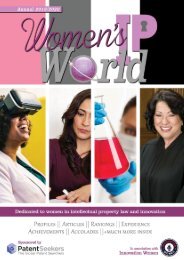Global IP Matrix - Issue 5
It has been a fantastic year for The Global IP Matrix magazine, thanks to all the efforts made by our contributors and to you, the reader for your continued support. We take great pleasure in putting together each issue of this publication, and we sincerely hope you enjoy this final issue of 2019. We have again, collaborated with some of the world's most influential IP law firms and businesses to bring you another eclectic mix of content, direct from the professionals working at ground level. We are already excited for the coming year and cannot wait to continue growing and evolving in our partnerships to bring you some exciting new features for 2020. Ms. Elvin Hassan Editor & Head of international liaisons
It has been a fantastic year for The Global IP Matrix magazine, thanks to all the efforts made by our contributors and to you, the reader for your continued support. We take great pleasure in putting together each issue of this publication, and we sincerely hope you enjoy this final issue of 2019. We have again, collaborated with some of the world's most influential IP law firms and businesses to bring you another eclectic mix of content, direct from the professionals working at ground level. We are already excited for the coming year and cannot wait to continue growing and evolving in our partnerships to bring you some exciting new features for 2020.
Ms. Elvin Hassan
Editor & Head of international liaisons
Create successful ePaper yourself
Turn your PDF publications into a flip-book with our unique Google optimized e-Paper software.
one of two legal regimes.<br />
Protection can either be through specific<br />
Geographical Indication laws or through<br />
trademark regimes where protection of<br />
certification or collective marks is possible. 11<br />
Also, 23 of the 47 countries mentioned above<br />
have specific laws providing Geographical<br />
Indication protection while in South Africa,<br />
there is sui generis Geographical Indication<br />
protection for only wines and spirits pursuant<br />
to a bilateral agreement with the EC. 12<br />
Of the 23 countries with sui generis<br />
Geographical Indication laws 13, 16 are<br />
Members of the African Intellectual Property<br />
Organisation (OAPI) and therefore have the<br />
same Geographical Indication law.14 In the<br />
remaining 24 countries, positive Geographical<br />
Indication protection can only be obtained<br />
through certification or collective trademarks<br />
under national trademark laws. 15<br />
The increased international<br />
awareness that exists in the GI<br />
space, suggests that many of the<br />
countries which currently only<br />
provide trademark protection<br />
for Geographical Indications are<br />
likely to move towards specific<br />
sui generis laws. However,<br />
though much locally in use, GIs<br />
are not generally recognised in<br />
Africa as protectable.<br />
The free to use communal<br />
nature of most African societies<br />
work against most attempts to<br />
have any form of proprietary<br />
right attached to available<br />
Geographical Indications. As<br />
a predominately agriculturalbased<br />
economy, wise counsel will<br />
prevail, if most African states<br />
incorporate the protection of<br />
Geographical Indications into<br />
their legislations.<br />
African Union<br />
2 World Intellectual Property Organisation.<br />
www.aopi.wipo.net/fr/OAPI/index.htm<br />
3 Larson, J. Relevance of geographical indications<br />
and designations of origin for the sustainable<br />
use of genetic resources. Food and Agriculture<br />
Organization (FAO), Rome, (2007)<br />
4 Uwanna, I. Intellectual Property: A Valuable<br />
Asset to Every Company, ‘n.d.’ i.uwanna@ta-ng.com<br />
5. See www.geographicindications.com<br />
5 Papadopoulos, I. An Economic Analysis of the<br />
Welfare Implications of Geographical Indications,<br />
World Trade Institute, (2003)<br />
6 Blakeney, M. “Proposals for the International<br />
Regulation of Geographic Indications,” The Journal<br />
of World Intellectual Property, Vol.4, No. 5, (2001)<br />
631<br />
7.Keith, E. M. Observations on the Development<br />
Potential of Geographical Indications. U.N.<br />
Millennium Project Task Force on Trade. March<br />
(2003)<br />
8 Sergio, E. International Protection of<br />
Geographical Indications and Developing<br />
Countries, South Centre Working Paper 10, (2001)<br />
3<br />
9 Rangnekar, D. The socio-economics of<br />
geographical indications. A review of empirical<br />
evidence from Europe, UNCTAD/ICTSD, <strong>Issue</strong><br />
Paper 8. (2004)<br />
10 These countries are Cape Verde, Comoros,<br />
Djibouti, Eritrea, Sao Tome & Principe, and<br />
Somalia.<br />
11 In many countries, it is possible to obtain<br />
trademarks with geographical references in certain<br />
circumstances. However, these are mostly particular<br />
types of trademarks which could either be collective<br />
or certification marks. There are several reasons<br />
for this. These include the fact that trademark<br />
law generally prohibits the registration of purely<br />
descriptive words and forbids misleading the<br />
consumer through the trademark itself. For further<br />
discussion see, e.g., Larson (2007)<br />
12see http://europa.eu/scadplus/leg/en/lvb/r12207.<br />
htm (last visited on 27 August 2011.<br />
13 Thompson, L. R., and Bukman, P. Geographical<br />
Indications. International Food & Agricultural<br />
Trade Policy Council (<strong>IP</strong>C), Washington, DC: USA.<br />
(2003) www.agritrade.org<br />
14 Wikipedia, Geographical Indication. Wikimedia<br />
Foundation Inc., (2007) www.en.wikipedia.org. Last<br />
visited on 8 August 2011 at 2.39 PM.<br />
15 The rationale of the ‘extension’ is that<br />
geographical indications for all products deserve<br />
the same level of protection, i.e., the one which<br />
applies currently is limited only to wines and spirits.<br />
In order to establish such uniform protection for<br />
all products and extend the additional protection<br />
of Article 23.1 of the TR<strong>IP</strong>S Agreement to other<br />
products, it is proposed to remove the reference in<br />
Article 23.1 of the TR<strong>IP</strong>S Agreement to wines and<br />
spirits.<br />
SafariRenewals<br />
. . . P r e s e r v i n g Y o u r R i g h t i n A f r i c a<br />
Safari Renewals LTD is a leading Intellectual Property N<strong>IP</strong>B renewal<br />
company in Africa handling <strong>IP</strong> renewal services in all African<br />
countries Nincluding OAPI and AR<strong>IP</strong>OB+ The company was primarily<br />
established to provide high quality and affordable <strong>IP</strong> maintenance<br />
services to the African community+<br />
Falomo1Ikoyi6 Lagos Nigeria P+O+Box @6464<br />
5078ON3B 738 678 34866O5078ON3B 847 033O@867<br />
renewals@safarirenewals+com<br />
www.gipmatrix.com<br />
w w w + s a f a r i r e n e w a l s + c o m<br />
23












